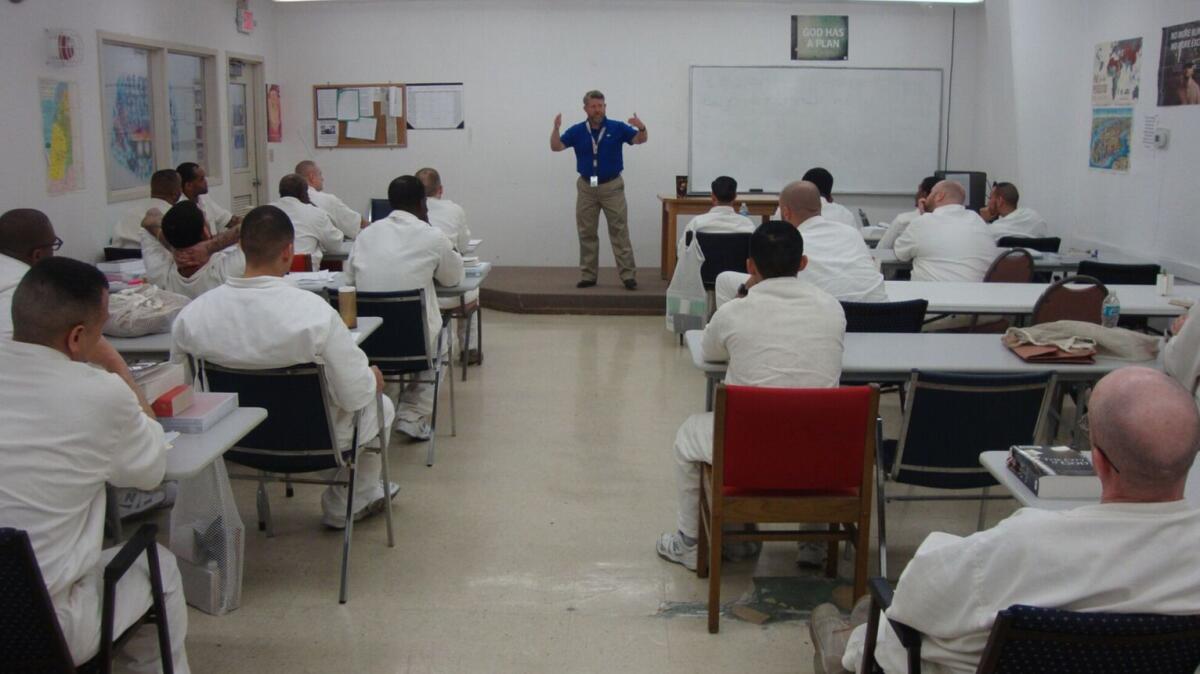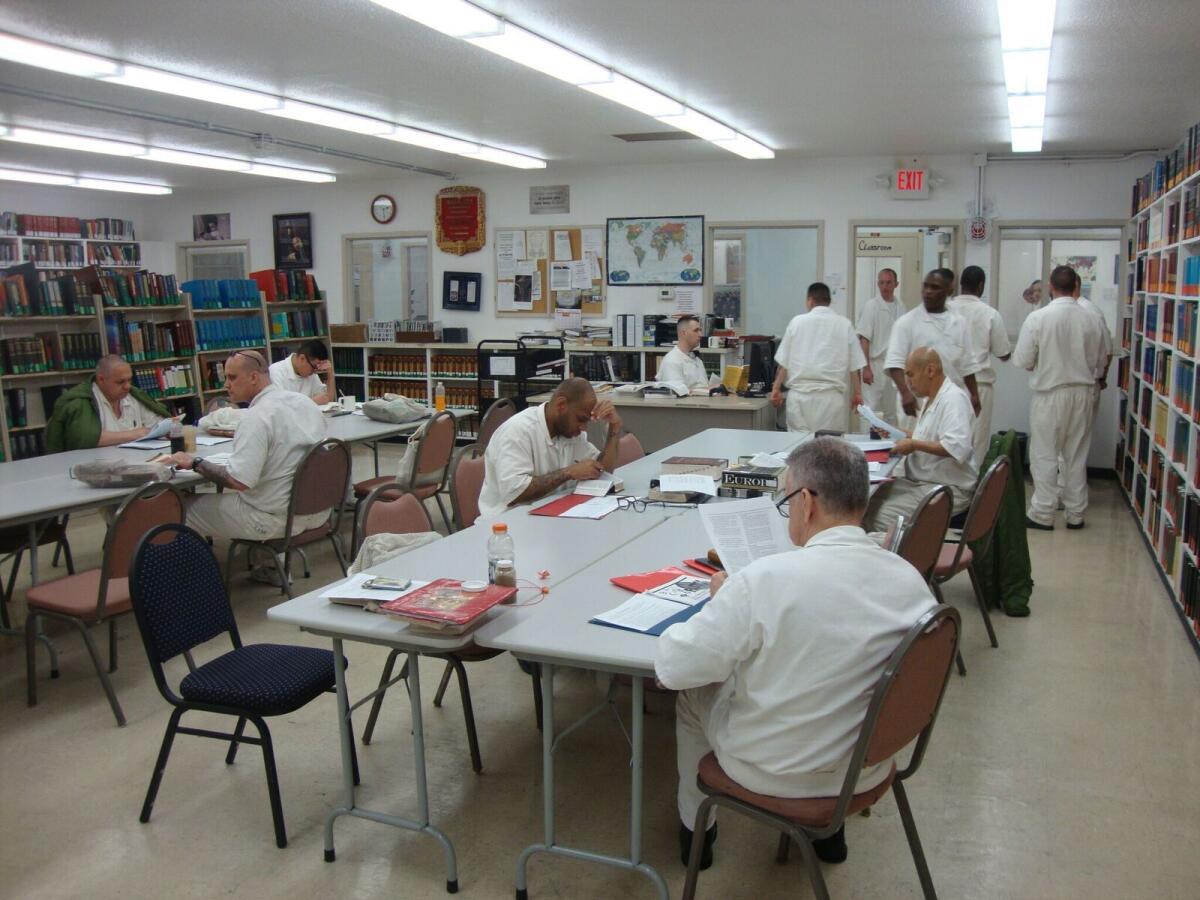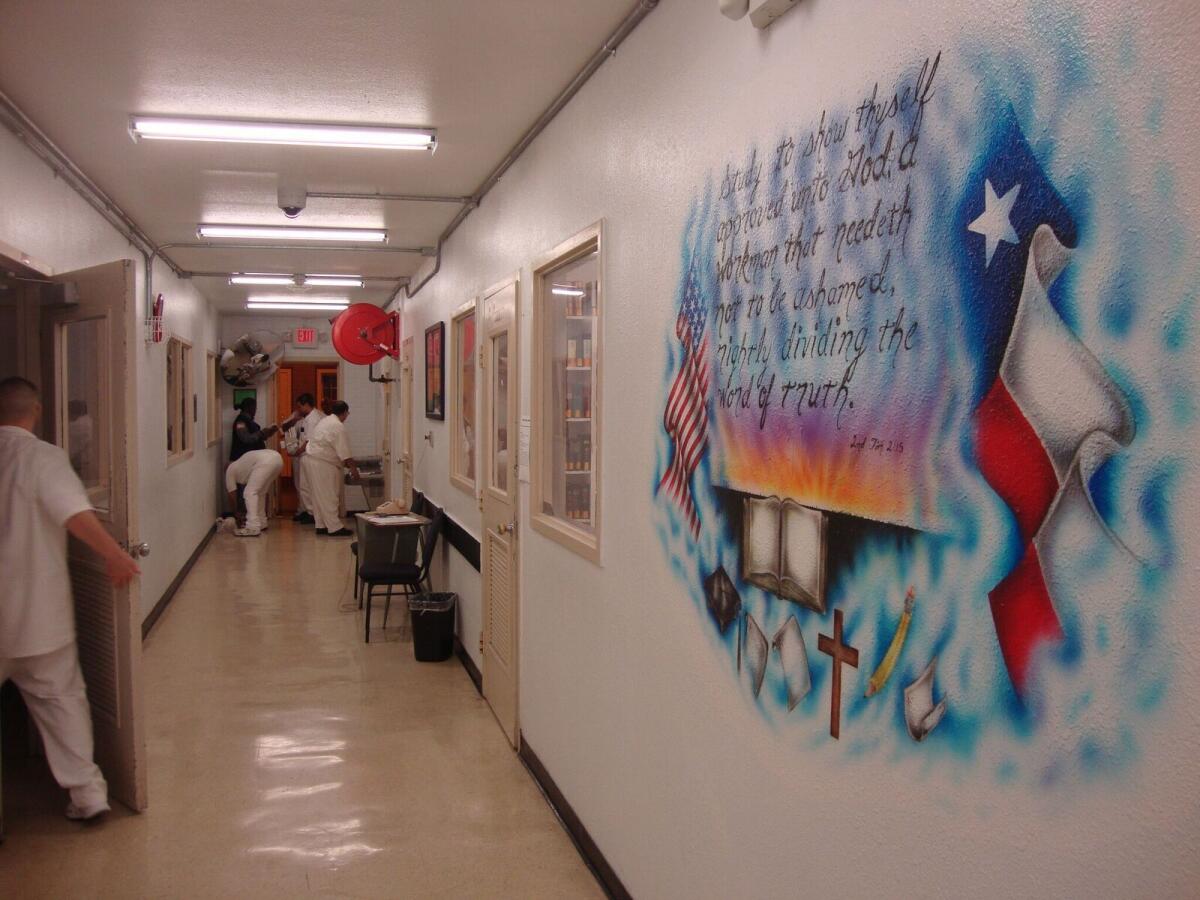Seeking God, and redemption, in a Texas prison seminary

- Share via
Reporting from Rosharon, Texas — Inmates in white uniforms carrying Bibles filed into a classroom at the maximum security Darrington Unit prison, some with gang tattoos snaking up forearms, others bearded and graying, all eager to contemplate the most vexing theological questions.
“Would hell be the place where God is not present at all?” professor Benjamin Phillips asked.
------------
FOR THE RECORD
An earlier version of this post said that Darrington was known as “Rocky D,” and referred to a theology conference at the University of North Carolina, Chapel Hill. Darrington is known as “Rockin’ D,” and it was an African American history conference.
------------
Along with their worn Bibles, the students thumbed through files of research at the ready from the seminary library and computer lab across the hall. They were a year away from finishing the four-year undergraduate program, ready with answers about heresy, annihilationists and sanctification.
But this time, none of the 27 men raised their hands, including the man with “Life” and “Hell” tattooed on his knuckles.
The men murmured. Finally, a consensus emerged. The answer was no, God is never absent. Even in hell. The professor nodded.
“Right,” he said. “Because then God would not be omnipresent.”
Southwestern Baptist Theological Seminary based in Fort Worth started this bachelor of science in biblical studies program six years ago and now has 180 students. On Monday the program will graduate its second class of “field ministers,” inmates serving lengthy sentences who promise to spend six years working in small teams with fellow inmates at prisons throughout the state.
Texas has the largest prison population in the country — about 147,000 prisoners — and in the vast system, violence and recidivism are persistent problems lawmakers hope seminarians can address at facilities known as the Snake Pit, Gladiator Farm, House of Pain, Burning Hell, and, in Darrington’s case, Rockin’ D.
California, Illinois and more than a dozen other states have similar prison seminaries. This one costs about $250,000 a year, paid for through donations to the nonprofit Heart of Texas Foundation founded by the father of a crime victim.
See the most-read stories this hour >>
The seminary is open to students of all religions: there have been Catholics, Jews and Muslims. Baylor University researchers have been studying the effectiveness of the seminary and the one it was modeled on at the notoriously violent Louisiana State Penitentiary, known as Angola. They plan to release a book about Angola this summer, and while they said it will take longer to gauge the effectiveness of the Texas program, they found participating has reduced seminarians’ risk of misconduct requiring discipline by 68%.
Aspiring seminarians must have a high school or equivalency diploma, pass a prison educational achievement screening and security clearance, and show good behavior for the past year.
One of this year’s seniors joined two of last year’s graduates in publishing “Exiles,” a book of daily prayers, or devotionals, geared toward those incarcerated long-term that’s available on Amazon and Kindle. Another graduate from last year recently recorded a lecture about civil rights activist W.E.B. Du Bois which was presented at a conference at the University of North Carolina, Chapel Hill.

At Darrington, guards summon seminarians to sit with suicidal inmates. Seminarians also volunteer as “tier walkers,” counseling hardened gang members housed on the prison’s tiers in solitary confinement, some for years for what they call “supreme violence.”
“We’re in the trenches, places other people don’t want to go,” said Mark Staley, 34, of Los Angeles, a Catholic who’s serving 60 years for fatally shooting a man outside a San Antonio bar.
“People are cutting off their testicles, throwing feces. There’s some serious mental issues. And a lot of these guys are going back to society,” said Staley, one of the better-educated students, having studied briefly at Santa Monica Community College.
“You’d be surprised the barriers we can break down, being in the same uniform,” he said.
NEWSLETTER: Get the day’s top headlines from Times Editor Davan Maharaj >>
Barriers have a tendency to give way in the seminary. Consider inmates Troup Foster and Calvin Small.
“People would see my racist tattoos and say, ‘Look who they’re letting in the Bible College!’” said Foster, 54, who did time in solitary after falling in with the Aryan Brotherhood while serving a life sentence for capital murder. “I had to show through my walk that I’m not that person anymore.”
Now he was sitting with a fellow seminary graduate serving also as a teaching assistant for this year’s class: Small, 45, a black Jew wearing a silver Star of David who used to be a Gangster Disciple and is serving a life sentence for aggravated assault with a deadly weapon.
The pair mused about why they reinvented themselves. Leaving gangs in prison can mean living in fear of attack. They take the risk, the men said, because they want to help younger inmates — persuade them to leave their gangs and stop reoffending once they’re released.
I was looking for a purpose to my life here. Because most likely I’m going to die here.
— Troup Foster, convicted murderer
“I was looking for a purpose to my life here,” Foster said. “Because most likely I’m going to die here.”
Sophomore seminarian Rene Joe DeLaRosa, 35, who is serving two life sentences for murder, doesn’t expect prisoners to leave the gangs right away. He didn’t.
“I was walking around with a Bible in one hand with the understanding with my homeboys that if something goes down, I’ll be on the front lines,” he said.
DeLaRosa used to recruit for the Texas-based Tango Blast prison gang — he has “Tango Blast” tattooed on his forearms — and watched new inmates arrive on the prison bus to see which one might be vulnerable to his pitch.
“I’d say, ‘Yeah, that’s a down soldier’” recalled DeLaRosa, who’s nicknamed “Fresno” after his hometown.
Then he watched an older, respected shot caller, Uncle Fonzie, become Christian and leave the gang, and he followed. Now DeLaRosa and other seminarians are brokering truces and persuading other gang leaders to convert.
“Some of the most hardened gang members with tattoos on their face, you talk to them about the Lord and you see them break and then all the guys following them are following you,” said Jason Gibson, 40, serving a 99-year sentence for burglarizing his parents’ home and shooting his stepfather, who survived.
Now Gibson teaches his fellow seminarians Greek.

In class, the inmates talk about lofty notions intertwined with prison life: redemption, salvation, wickedness and was what referred to in one class as “the great white throne of judgment.”
If you live the good life, Phillips said, you’re supposed to receive a reward, right?
“Fruit cup!” several prisoners shouted, a reward for good behavior behind bars. That prompted a few laughs.
Some have not had a visitor in more than a decade. Others have thrown away court transcripts used for their appeals. One of the men who helps run the program, Brandon Warren, 35, is a parolee who earned his master’s from Southwestern Baptist on the outside. That’s not something most seminarians expect to do.
During class, Phillips urged them to embrace their prison family.
“Just because you are going to become a preacher, don’t set your culture aside,” he said. “Love your culture, love this community. The city of God is not composed entirely of righteous men.”
Follow @mollyhf on Twitter.
ALSO
As Denver enjoys boom times, the homeless go into hiding
The nation’s subways are falling apart, but the next president might actually fix them
Supreme Court, wary of major new cases, to rule on cheerleaders’ outfits and adult diapers
More to Read
Sign up for Essential California
The most important California stories and recommendations in your inbox every morning.
You may occasionally receive promotional content from the Los Angeles Times.














